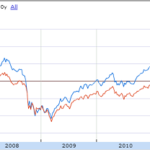There has been plenty of talk about Greece leaving the Eurozone in the last two years, yet the beleaguered nation continues to hang on for its life. This may be about to change. Anders Borg, Sweden’s finance minister, was last weekend quoted as saying Greece may have to leave the Euro within six months. This echoes Saxo’s previous prediction that Greece only has a 50% chance of staying in the currency zone within the same period, which from a forex trading account perspective would be worth considering for long term currency trades.
My guess is that a Grexit will be used as the ultimate price for Germany’s continued assistance for the other peripheral states. Merkel is steering an incredibly treacherous passage between the Scylla of skeptical German public opinion and the Charybdis of a Euro collapse due to the exit of a large peripheral beast like Spain or Italy.
Keeping Greece in the Eurozone would, in any case, require an incredibly tricky balancing act of the carrot and stick: carrot to give the Greek people a positive vision of the future – almost any positive vision – keeping them motivated and off the streets; stick to eliminate the moral hazard that open-ended support can imply.
A Grexit may well be seen in German political circles as both economically containable and politically desirable, as it subsequently enables Angela to be seen as taking a tough stance on countries like Portugal, Spain and Italy, but also showing her electorate they are not throwing good money after bad. But if Germany sees this as the acceptable price to be paid, then I feel they are tragically underestimating the risk of contagion. Once the reversibility of the Euro is plain for all to see, Italy and Spain would be next in line – meaning the whole Euro project would again be thrown into question.
On the other side of the Atlantic another storm is brewing: the US fiscal cliff. Let us clarify the dangers attached to the fiscal cliff should politicians in Washington fail to agree on a new deal to raise the debt ceiling. Spending cuts and tax rises will be automatically triggered to the tune of $600 billion, or approximately 3.7% of GDP. This is more austerity than any European ‘Club Med’ country is willing to enact. It will have large implications for the economy, but also the stock market. A rule of thumb says that a 1% shift of GDP equals $5-7 in earnings per share for S&P500 companies. So, no new fiscal deal and we’re talking about a cliff indeed.
The story in Europe and the fast-approaching fiscal cliff are the factors that I believe will limit any rally in the EUR from these levels; as the year comes to a close the safe haven offered by the United States will become increasingly attractive.











{ 0 comments… add one now }